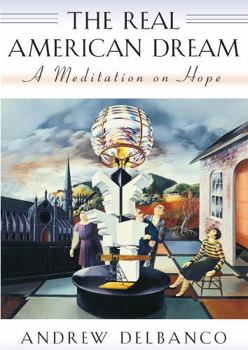The Real American Dream: A Meditation on Hope
(Part of the The William E. Massey Sr. Lectures in American Studies Series)
Select Format
Select Condition 
Book Overview
Since we discovered that, in Tocqueville's words, "the incomplete joys of this world will never satisfy the heart," how have we Americans made do? In The Real American Dream one of the nation's premier literary scholars searches out the symbols and stories by which Americans have reached for something beyond worldly desire. A spiritual history ranging from the first English settlements to the present day, the book is also a lively, deeply...
Format:Paperback
Language:English
ISBN:0674003837
ISBN13:9780674003835
Release Date:September 2000
Publisher:Harvard University Press
Length:160 Pages
Weight:0.42 lbs.
Dimensions:0.4" x 5.1" x 7.5"
Customer Reviews
3 ratings
An academic who can write!
Published by Thriftbooks.com User , 24 years ago
Anyone wondering what makes this country tick will find a fascinating thesis contained in just 100 readable pages. Obviously the scholarship is deep and thorough, but the thinking is fresh and applicable. (Did you ever wonder why the word 'academic' means 'useless'? This book is just the opposite.) At the end, when Professor Delbanco gets to the present day,though, he seems to run out of steam, and loses some of his clarity. He just kind of ends the book without really drawing the powerful conclusion he's leading to -- but a thought-provoking and important book nonetheless.
Seeking A Cultural Cure For Depression
Published by Thriftbooks.com User , 24 years ago
Oddly enough, the book is about avoiding depression. But rather than offering the normal remedies (therapy, the correct choice of psychoactive drugs, a regimen of positive thinking) the author believes that some vision of transcendence provided by our shared culture is the only psychological salvation. This vision may be religious in form, as it was for the Puritans, or it may be secularized, as it was from roughly 1850 to the 1960's. Between the late 60's and the 80's "something died, or at least fell dormant"; there is now no vision greater than the self (and he asserts this would imply a social vision, one involving "fellowship and reciprocity"). As a consequence, he believes people nowadays are increasingly depressed, as the term was defined by the likes of Lionel Trilling and Graham Greene. The books is pitched at a very high level of synthesis, but somehow he pulls it off. It is beautifully written; the sweeping sentences are laden with apt quotations and rich with resonance. The sense of compact assurance falls off a bit at the end as he tries to draw conclusions about our current cultural plight (as he sees it). His is basically a religious sensibility, one he would like to persuade us all people (or at least thinking people) share and all societies need, preferably focussed on increasing justice for everyone, although he's not really sure a purely secular version works, since the secular project seems to have failed. He's engaging in social psychology, relating our current lack of a sustaining social faith to a pervasively sick personal psychology. It's a genre of cultural criticism, very high minded and sincere. But many people are oblivious to this genre and even manage to live meaningful or at least happy lives without experiencing the sense of insulated selfhood and anomie that he describes. Some might be better off if they did, and one of the satisfactions of reading such a book is the feeling that "I, at least, share this refined and ennobling sensitivity." Unfortunately, many readers, whether oblivious or ennobled, will not be persuaded to energize the admirable liberal social values he affirms by the argument that they are a cure for their own psychological ills.
Short perspective on the history of our cultural malaise
Published by Thriftbooks.com User , 25 years ago
By the authors admission and intention this is not an exhaustive study of our self-evident cultural illness and spiritual "neediness". However it provides useful signposts from which to read further. As someone who does not count himself among intellectuals I found it very readable and enjoyable. I particularly appreciated his exploration of Lincoln's will to repair and further build on the foundation of our nations founders - in particular Jefferson. This book inspires me to ask the author to explore more in a future lecture series - to discuss the magnitude and meaning of volunteerism against his backdrop - and of the potential of Internet communities (naive hope or a positive sign?). As we approach the millenium and find ourselves awash in less thoughtful and more fearful views his lectures are a useful reassurance that in this young country there have always been far reaching uncertainties - always been a sense of spiritual incompleteness - and always been a hunger for remedy. In fact, isn't the hunger the solution rather than a problem to solve? The author speaks for the immediate importance of national and global solutions rather than personal and local solutions but I suspect that thriving in the coming age requires even further (albeit frustrating) introspection among peoples and local communities (and the consequent damage that will likely occur as we neglect one another)before we are ready to "will" this new paradigm to emerge. But he leaves us with the confidence it will emerge... with new promise and its own peculiar new neediness.One negative: As in a live lecture... In the final 20 pages I felt it racing to conclusion and wondered if time constraints in the lecture or some mischevious editor were responsible or if Professor Delbanco was actually ready to conclude.***Read It***







